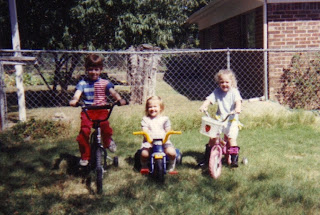 I was constantly referred to as "the girl" by all the boy kids I played with. If I won a wrestling match or basketball game (which was not unusual!), the boy(s) I beat were ribbed that they had been "beat by the girl." The next time we competed they were determine to beat me to re-prove their manhood. Much like Lydia mentioned, I was considered the weaker sex. To be beat by me, a female, was the ultimate humiliation. I never really considered the distinction as a child, I simply accepted that boys expected me to be an easy target. Unfortunately for them, I did not meet their expectations; whether it was a fist-fight or a friendly game of knock-out, I was in for the win.
I was constantly referred to as "the girl" by all the boy kids I played with. If I won a wrestling match or basketball game (which was not unusual!), the boy(s) I beat were ribbed that they had been "beat by the girl." The next time we competed they were determine to beat me to re-prove their manhood. Much like Lydia mentioned, I was considered the weaker sex. To be beat by me, a female, was the ultimate humiliation. I never really considered the distinction as a child, I simply accepted that boys expected me to be an easy target. Unfortunately for them, I did not meet their expectations; whether it was a fist-fight or a friendly game of knock-out, I was in for the win.
This competitive nature stayed with me as I started school. I was determine to be the best I could be, not because I wanted to pad a resume- I never feared that I would not get into my top choice schools- but because I wanted to push myself to the limit and see where the breaking point was. While reading the article by Sara Rimer, "Girls Need to be Perfect," I felt that it was somewhat ridiculous and superficial. The students featured in the story were complaining that they were taking two to five AP courses and could not keep up with their studies and extracurricular. They obviously live in an upper class neighborhood, meaning their parents have plenty of money. They wear designer clothing, drive nice cars, and probably have most things they wanted given to them.
The students I went to school with took six to seven IB courses and then tested in the AP tests as well. They put on three to five full sized drama productions (and won State
UIL every year), played in the marching band, met at six am to run cross-country, and stayed after school to tutor low performing students, train for academic decathlons, or other academic UIL competitions. Some of us even held down full time jobs. Our parents were not filthy rich, we did not wear designer clothes (or whine that we didn't have them). We worked hard and enjoyed our classes and our extracurricular because we wanted to do them, not because we were "marketing ourselves to colleges" ("Girls Need to be Perfect"). We had fun and enjoyed school. There were times when we all stressed over college applications or exams, but we were not obsessive and the common drive to succeed (in the lowest income school district in Texas and show the world that we were not all losers) brought us together.
This drive to do well and succeed can be seen in Maxine Hong Kingston's Woman Warrior. The woman's traditional role in the family is often disregarded. Although the family would often not survive without a mother, she is not respected as much as the man. Kingston gives an example of this in the first section of her book. The treatment of the "no-name woman," the main character's aunt, was much harsher than the treatment of the man who impregnated her (WW, 5). Because of the disregard that the women had suffered through, they came to the realization that they must become something more than a "wife or slave" to gain respect (WW, 19). That the women tie motherhood and wifedom to slavery is not a mistake, these traditional roles hold no freedom for them. The stories that she is told about Fa Mu Lan are experienced in first person. Her mother teaches her the lessons of strength and freedom through the fabled warrior. It is the only way she knows to raise and protect her child against the process of growing up and facing the hardships of life. She expects her daughter to do greater things than she herself was able to do, she brought her to America to give her the opportunities that she herself never had. It is imperative that her daughter succeed and do well- she wants her to become a modern day warrior, a "heroine, swordswoman" (WW, 19).
Kill Bill is an excellent example of our modern day woman warrior.
Whether in literature or in real life, women feel the need to "catch-up" with men. If you look around, all the people throughout history that we consider to be great thinkers, warriors, or leaders were men. How many women could have been remembered as well if they had simply been given the chance. Maybe Einstein's sister was also a genius, or Newton's daughter the next great alchemist. We will never know. Centuries of repression leave us with our own type of stories and our own drive to succeed. One day, when our daughter's daughters look back on history, we will tell them the true accounts to women heroics instead of bedtime fables.

